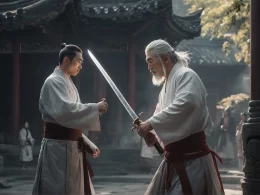Idiom Explanation:
The weight of a single sentence is as heavy as nine tripods. Describe the words or opinions that can play a decisive role.
Pronunciation:
一言九鼎
yī yán jiǔ dǐng
origin:
《史记·平原君列传》:“毛先生一至楚;而使赵重于九鼎大吕。”
story:
Once upon a time, there was a national treasure in the Eastern Zhou Dynasty, the Nine Cauldrons, which was a symbol of the king's rule over the world and everyone wanted to have it. At that time, the Zhou dynasty was weak and wanted to keep the tripod, but it did not dare to offend the vassal states.
The king of Zhou (for example, King Xian of Zhou (321 BC)) was very afraid, but he did not dare to offend Qin. " When Yan Di arrived at Qi, he said to the king, "Now the king of Qin is tyrannical and uncaring, raising a strong army, threatening the king of Zhou, and demanding the Nine Cauldrons. I, the ruler and ministers of the Eastern Zhou Dynasty, thought about the countermeasures in the court, and finally agreed that it would be better to give the Nine Cauldrons to your country rather than to the tyrant Qin. It would be a great blessing for your country if you could get such a national treasure as the Nine Cauldrons. I hope the king will strive for it!" The king of Qi was so pleased to hear this that he immediately dispatched 50,000 troops and appointed Chen Chen Si as the commander-in-chief to go to the aid of Eastern Zhou, and the Qin soldiers reluctantly withdrew their troops.
When the king of Qi was ready to ask the king of Zhou for the Nine Cauldrons to fulfill Yan Rui's promise, the king of Zhou was worried again. Yan rate said, "Your Majesty need not worry, please allow me to go to Qi to settle this matter." Yan rate came to Qi and said to the king of Qi, "This time our country was preserved thanks to the righteousness of your country, so we are willing to give up the Nine Cauldrons, but we have to pass through several countries to get from our country to Eastern Qi, which route does your majesty intend to take to bring the cauldrons here?" The king of Qi replied, "I am prepared to take the road to Liang."
Yan Rui said, "You must not go through Liang, because Liang has wanted the Nine Cauldrons for a long time, and they have been planning this for a long time in the area of Hui Tai and Shao Hai. So once the Nine Cauldrons enter Liang, it will be difficult for them to come out again." Then the king of Qi said, "Then I am prepared to go through the state of Chu." Yan Rui replied, "This will not work either, because the rulers and ministers of Chu have been planning to get the Nine Cauldrons in Ye Ting (the name of the place) for a long time. If the Nine Cauldrons entered the state of Chu, they would never be shipped out again. The king of Qi said, "Then where exactly will I bring the Nine Cauldrons to Qi?" Yan Rui said, "We, the rulers and ministers of the Eastern Zhou, are also worried about this matter in private, Your Majesty. The Nine Cauldrons were not like vinegar bottles or jars of sauce that could be carried in the hands or arms to Qi, nor were they like birds gathering, crows flying, rabbits jumping, or horses galloping to Qi. When King Wu of Zhou fought against King Zhou of Shang to get the nine pods, 90,000 people were used to pull and transport one pod, and the nine pods were 91,000 people in total. Even if the king had such manpower and material resources, he would not know which way to transport the Nine Cauldrons to Qi. Therefore, I have been worrying about the king in private."
The king of Qi said, "You have come to Qi repeatedly, but you still don't want to give me the Nine Cauldrons!" Yan Rui hurriedly explained, "How dare I deceive your kingdom? As long as the king can quickly decide which way to carry them, I, the ruler and ministers of Eastern Zhou, can relocate the Nine Cauldrons to be at your command." The king of Qi finally gave up the idea of obtaining the Nine Cauldrons.
This shows the weight of the Nine Cauldrons. According to "The Records of the Grand Historian", "Mr. Mao (Mao Sui) made Zhao heavier than the Nine Cauldrons when he arrived at Chu." It means "one word is worth nine pots", describing the great effect of one word. Later, people gradually derived the idiom of "one word is worth nine tripods".
Similar Idioms:
- 一字千金
- 一言为定
- 金口玉言












